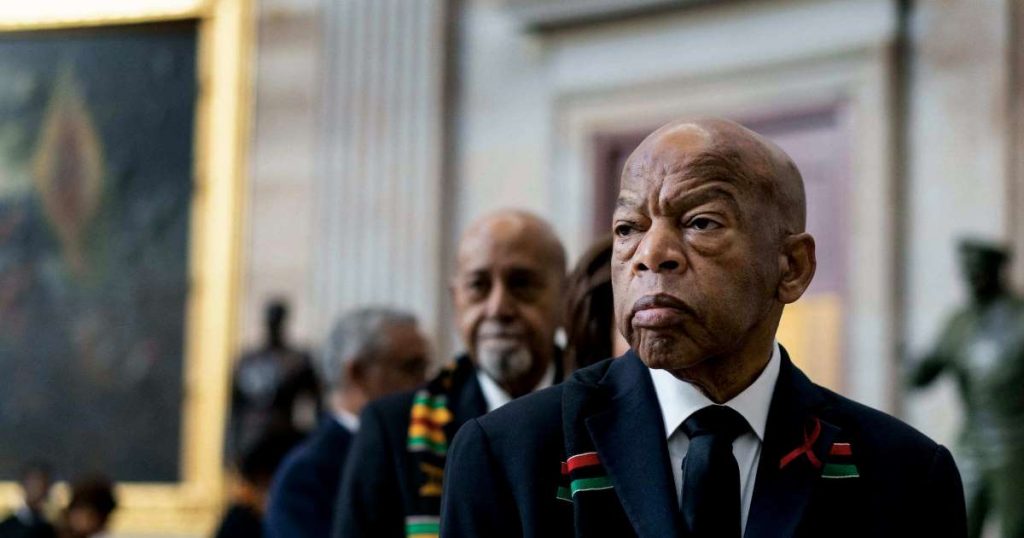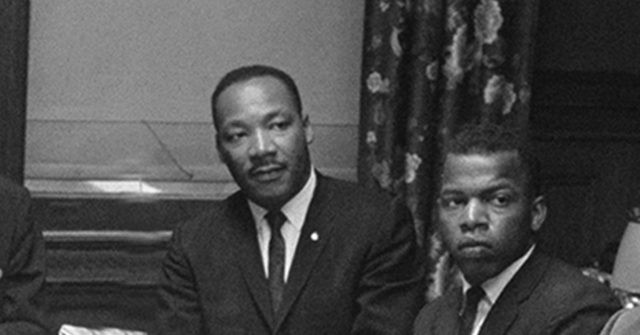The death of civil rights icon John Lewis prompted an outpouring of tributes on Saturday, a combination of mournful praise and calls to action as the nation faces a fresh reckoning with persistent racism a half century after his pioneering protests for Black equality.
“Not many of us get to live to see our own legacy play out in such a meaningful, remarkable way. John Lewis did,” former President Obama said in a written tribute. “And thanks to him, we now all have our marching orders — to keep believing in the possibility of remaking this country we love until it lives up to its full promise.”
Lewis, 80, who died of pancreatic cancer late Friday, made an early mark as a young leader of the 1960s civil rights struggle, helping to lead the 1963 March on Washington, suffering wounds from a police beating in Selma, Ala., in 1965, enduring dozens of arrests and then serving as a House of Representatives member from Georgia since 1987.
His death was mourned by figures who had known him for decades and by a younger generation of Black people, who have been on the front lines of the protests for police reform in the wake of the death of George Floyd while in Minneapolis police custody. Lewis’ last appearance was at a Washington protest in early June, and his last with Obama was in a virtual town hall addressing activists leading this summer’s protests.

“How fitting it is that even in the last weeks of his battle with cancer, John summoned the strength to visit the peaceful protests where the newest generation of Americans had poured into the streets to take up the unfinished work of racial justice,” House Speaker Nancy Pelosi said in a statement. She long had an especially close relationship with Lewis.
“John Lewis had the clearest vision of justice there can be,” said Rashad Robinson, president of Color of Change, a civil rights group. “He saw how civil rights would transform America, but he knew there would be no civil rights without the kind of Black political power that was willing and capable of disrupting the status quo. He became that power, and he disrupted the status quo.
“He told Black Lives Matter activists that he wished he had an open internet in his time,” Robinson said.
In a proclamation under President Donald Trump’s name, the White House ordered the flag to be flown at half-staff, including at U.S. facilities worldwide, as is traditional for those so honored. Trump remained mum about Lewis on Saturday morning, and left it to his spokeswoman to post a comment on Twitter.
“Rep. John Lewis was an icon of the civil rights movement, and he leaves an enduring legacy that will never be forgotten,” tweeted White House Press Secretary Kayleigh McEnany. “We hold his family in our prayers, as we remember Rep. John Lewis’ incredible contributions to our country.”

A week before he was sworn in as president, Trump launched a bitter Twitter attack on Lewis, after Lewis questioned the legitimacy of Trump’s election and said he would boycott the inauguration.
“Congressman John Lewis should spend more time on fixing and helping his district, which is in horrible shape and falling apart (not to mention crime infested) rather than falsely complaining about the election results,” Trump tweeted, mischaracterizing the congressman’s Atlanta-area district. “All talk, talk, talk — no action or results. Sad!”
Backlash against his attack on Lewis helped prompt a broader boycott of the inauguration.
A young John Lewis is seen in the foreground being clubbed by a state trooper during a civil rights protest in Selma, Alabama, in 1965.
Obama, in his tribute, recalled his own, very different inauguration experience with Lewis, when Obama became the nation’s first Black president. “I hugged him on the inauguration stand before I was sworn in and told him I was only there because of the sacrifices he made.”
Praise for Lewis also came in from some Republicans, including those who have blocked his legislative causes, including a pending bill to renew the Voting Rights Act. The House has passed that measure but the GOP-controlled Senate has declined to consider it — a fact many on social media noted in responding to a Lewis tribute from Senate Majority Leader Mitch McConnell (R-Ky.).
McConnell said in a statement, “You did not have to agree with John on many policy details to be awed by his life, admire his dedication to his neighbors in Georgia’s Fifth District, or appreciate his generous, respectful and friendly bearing.”
“What a loss,” said House Majority Whip Steve Scalise of Louisiana in a “Fox and Friends” interview. “You knew you were serving amongst someone who was a legend, who was a giant.”
Democrats’ presumptive presidential nominee, Joe Biden, and his wife, Jill, issued a statement that began, “We are made in the image of God, and then there is John Lewis. How could someone in flesh and blood be so courageous, so full of hope and love in the face of so much hate, violence, and vengeance?”
The Bidens said they had talked to Lewis a few days ago and found him upbeat and encouraging. “Instead of answering our concerns for him, he asked about us,” the Bidens said. “He asked us to stay focused on the work left undone to heal this nation.”
Lewis also drew praise from Biden’s final primary rival, independent Sen. Bernie Sanders of Vermont, who said:
“His courage helped transform this country. He won’t ever be forgotten by those who believe America can change when the people stand together and demand it. “
Sen. Kamala Harris of California, a Black Democrat who is also ran for president in 2020 and is being considered by Biden as a possible running mate, said of Lewis, “He carried the baton of progress and justice to the very end. It now falls on us to pick it up and march on.”
(SOURCE: TNS)
(Article written by Janet Hook)
The post Tributes Abound for Rep. John Lewis After the Death of the Civil Rights Giant appeared first on The Network Journal.
